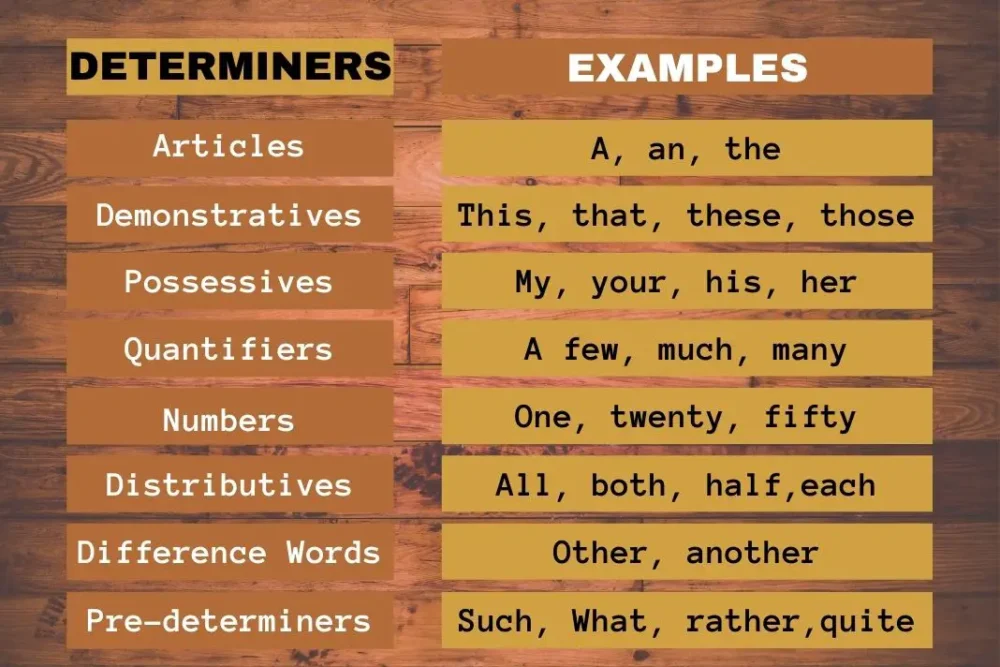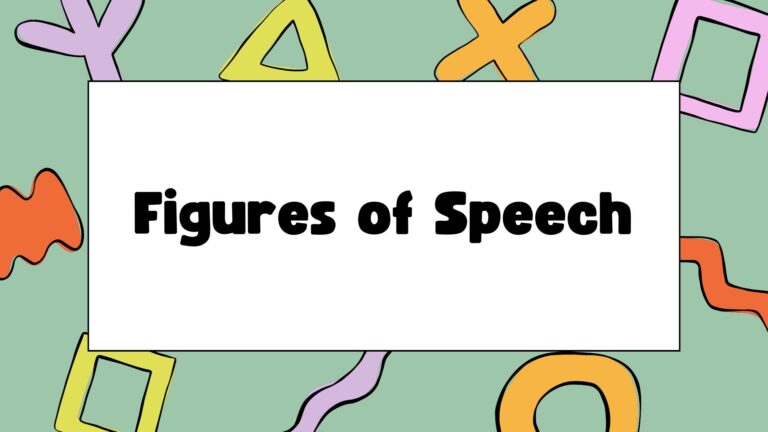Determiners
Determiners help make communication clear. Here you would find the detailed explanation of determiners and its types with examples.
Introduction to Determiners
Determiners help clarify nouns by providing context. They show details like specificity, quantity, and charge on a thing, making nouns more meaningful. For example, in “some apples,” the determiner “some” indicates an unspecified number, telling about the amount.
Determiners also connect ideas within sentences. The difference between “the book” and “a book” can change the focus of a conversation. “The book” suggests familiarity, while “a book” introduces something new. These small differences are important in storytelling and effective writing.
Types of Determiners
Knowing the 7 types can improve your writing and speaking.
- The first type is articles, like “a,” “an,” and “the.” These words show if a noun is specific or general.
- The next type is demonstratives, such as “this,” “that,” “these,” and “those.” They point to specific items or groups from the speaker’s view.
- Possessive determiners, including “my,” “your,” “his,” and “her,” show ownership.
- Quantifiers, like “some,” “many,” and “few,” tell us about quantity without giving exact numbers.
- Distributives, such as “each,” “every,” and “either,” focus on individual members of a group.
- Interrogative determiners, like “which” and “what,” are used to ask questions.
- Finally, numerical determiners, like “one,” “two,” or “three,” give exact counts.
Articles: Definite and Indefinite Types
The definite article “the” points to a specific noun that both the speaker and listener know. For example, saying “the book” refers to a particular book that has likely been discussed before.
The indefinite articles “a” and “an” introduce nouns in a general way, which leads to broader interpretations. For instance, saying “a cat” refers to any cat, not a specific one, sparking curiosity about that cat. The difference between definite and indefinite articles adds richness to our language, helping us express not only what we mean but also how we want to be understood.
Demonstrative: This, That, These, Those
Demonstrative determiners like “this,” “that,” “these,” and “those” are important for communication. “This” and “these” refer to things that are close to us. For example, saying “this book” suggests a connection to it, inviting others to engage with us. On the other hand, “that” and “those” suggest distance, indicating a past connection or a broader view, which allows for reflection.
Possessive: Showing Ownership
Possessive determiners, like “my,” “your,” “his,” and “her,” are important in conversation. They show ownership but also express emotions and identity. When we say “my home,” it brings feelings of warmth and safety. Saying “your ideas” suggests teamwork and respect.
Quantifiers: Expressing Quantity and Amount
Quantifiers help us express amounts clearly. They can be general, like “many” and “few,” or specific, like “ten” or “three-quarters.” This variety allows us to share not just numbers but also feelings related to those amounts. For example, saying “a handful of friends” implies a small group and suggests closeness, while “countless opportunities” gives a sense of plenty.
Distributive: Focusing on individual
These determiners focus on individual members in a group rather than whole group. These modify nouns. Distributives could be “each”, “every” or “either”. It tells us the importance of an individual in a whole group. For example, “All bananas were roped”.
Interrogative: Asking Questions
Interrogative determiners, like “which,” “what,” and “whose,” are important in grammar. They help us ask questions and guide conversations. For example, asking “Which book do you prefer?” leads to a different type of response than “What book do you prefer?” This shows how small changes in language can make our conversations more interesting and clear.
Here is the short summary of determiners for your understanding.
| Types | Word for Determiner | Examples |
| Articles | a, an, the | He was roaming on the road. |
| Demonstrative | this, that, these, those | I like that pen very much. |
| Possessive | my, your, his, her | I do to college on my Mercedes Benz. |
| Quantifier | many, few, specific | I saw many children on the road going to school. |
| Distributives | each, every, either | He respects his every employee of the company. |
| Interrogative | what, where, which | Where do you live now? |
| Numerical | one, two, three | He gave me three chocolates. |
Determiners are not adjectives:
Determiners are also sometimes called ” limiting adjectives”. But determiners are not adjectives. For more explanation you can visit here.



